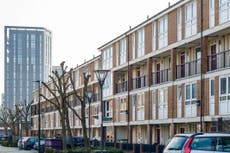Your support helps us to tell the story
From reproductive rights to climate change to Big Tech, The Independent is on the ground when the story is developing. Whether it's investigating the financials of Elon Musk's pro-Trump PAC or producing our latest documentary, 'The A Word', which shines a light on the American women fighting for reproductive rights, we know how important it is to parse out the facts from the messaging.
At such a critical moment in US history, we need reporters on the ground. Your donation allows us to keep sending journalists to speak to both sides of the story.
The Independent is trusted by Americans across the entire political spectrum. And unlike many other quality news outlets, we choose not to lock Americans out of our reporting and analysis with paywalls. We believe quality journalism should be available to everyone, paid for by those who can afford it.
Your support makes all the difference.Hundreds of renters have been thrown out of their homes in the middle of lockdown after the government caved in to landlord lobbying and introduced loopholes to its eviction ban.
New figures show eviction attempts by landlords doubled during the winter coronavirus lockdown, while more than 500 households were forced out by county court bailiffs.
The government promised in March that nobody would be made homeless because they had lost their income due to coronavirus, and put a blanket ban on evictions.
But after lobbying from landlord groups, ministers introduced new loopholes to the policy so that those hit hardest by the pandemic and furthest behind on rent could be kicked out.
As of January, anyone with rent arrears over six months can be evicted, even if the shortfall was accrued during the pandemic. Previous versions of the ban required debt to have been built up over nine months or more, not including that accrued after the start of the first lockdown.
The 500 households figure for those forced out by bailiffs is likely to be “the tip of the iceberg”, as overall homelessness rose by nearly 4,000 households to 68,680 in the most recent data available.
In the final quarter of 2020 more than 2,000 orders were issued for people to leave their homes.
Labour said the government was breaking its promise and that the ban needed to be strengthened.
“Far from ‘putting their arms around the British people’, the government allowed hundreds of renters to be evicted during lockdown," said shadow housing secretary Thangam Debbonaire.
“This is just the tip of the iceberg, as tens of thousands were made homeless during the winter months.
“Everybody deserves security in their home, but throughout the Covid crisis, the government has consistently made last minute decisions that put renters at risk.
“Ministers promised nobody would lose their home because of coronavirus, but the current ban isn’t working. The government should give people security in their homes, by strengthening and extending the ban for the period that restrictions are in place.”

Tenants’ unions have also criticised the weakening of the policy, with the London Renters’ Union branding it a “fake eviction ban”.
Ministers on Sunday announced that the ban, which was set to expire this coming week, will run until at least the end of March. The government has repeatedly extended the ban by just a few weeks at a time.
The policy only applies to England because housing is a devolved issue in Wales, Scotland and Northern Ireland.
In Wales and Scotland separate eviction bans are expected to run until the end of March, and in Northern Ireland, rules requiring landlords to give 12 weeks’ notice before moving to eviction proceedings have also been extended to next month.
Announcing the extension of the ban, housing secretary Robert Jenrick said: “We have taken unprecedented action to support renters during the pandemic, including introducing a six-month notice period and financial support to help those struggling to pay their rent.
“By extending the ban on the enforcement of evictions by bailiffs, in all but the most serious cases, we are ensuring renters remain protected during this difficult time.
“Our measures strike the right balance between protecting tenants and enabling landlords to exercise their right to justice.”
A Government spokesperson said: “We’ve put households right at the heart of our decision-making, spending hundreds of billions to safeguard jobs, protect incomes and boost welfare support
“Robust protections remain in place with most renters still subject to six months’ notice periods, while the ban on bailiff evictions for all but the most serious cases will stay in place until at least 31 March.”
However, the six month notice period and ban do not apply in the cases where someone has built up the arrears referred to in the article.


Join our commenting forum
Join thought-provoking conversations, follow other Independent readers and see their replies
Comments